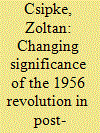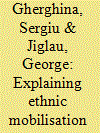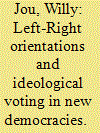| Srl | Item |
| 1 |
ID:
101808


|
|
|
|
|
| Publication |
2011.
|
| Summary/Abstract |
This article contributes to the study of women's entrepreneurship in transition economies by examining Russian self-employed women's experiences and interpretations of gender in the context of entrepreneurship. It traces how gender articulates the opportunities for and the constraints on entrepreneurial activities in Russian society. As such, this article engages in the theoretical discussion of gendered patterns of entrepreneurship. The article employs a qualitative methodology and analyses semi-structured interviews with women entrepreneurs conducted in St Petersburg and in two towns in the Republic of Karelia during the period 2005-2006. The respondents represent small and medium-sized enterprises mainly in production, retail trade and services.
|
|
|
|
|
|
|
|
|
|
|
|
|
|
|
|
| 2 |
ID:
101809


|
|
|
|
|
| Publication |
2011.
|
| Summary/Abstract |
This article explores the changing political uses of the memorialisation of the 1956 revolution in Hungary since 1989, in written history and in public monuments and displays. 1956 was central to the political discourse in 1989; merely 10 years later its anniversary publicly carried the significance of a bank holiday but within a few more years, and especially by the time of the 50th anniversary in 2006, the revolution had become a recurring motif in politics, as the political parties tried to stake their claim as the heirs of 1956. The article illustrates how the 1956 revolution first decreased and then increased in importance over the 20 years following the fall of communism, and how this was a direct result of the ability to use the revolution's memory for political gain.
|
|
|
|
|
|
|
|
|
|
|
|
|
|
|
|
| 3 |
ID:
101807


|
|
|
|
|
| Publication |
2011.
|
| Summary/Abstract |
The complex dynamics of inter-ethnic relations in post-communist countries leads to a puzzle: why do some ethnic minorities mobilise to obtain political representation whereas others do not? We use qualitative comparative analysis to capture complex causal patterns explaining the formation of ethnic parties and to analyse the combined effect of social, economic and political variables. Our article bridges a significant gap in the existing literature that usually focuses on simple explanations for the existence of ethnic parties. The analysis reveals that the political mobilisation of ethnic minorities is explained by institutional elements often underemphasised in existing theories and research.
|
|
|
|
|
|
|
|
|
|
|
|
|
|
|
|
| 4 |
ID:
101806


|
|
|
|
|
| Publication |
2011.
|
| Summary/Abstract |
The left-right schema encapsulates major political cleavages and constitutes an important link between voters and parties. Using election surveys in Slovenia covering the period 1992-2004, this study examines the anchoring of left-right orientations by social structure and party preference in Slovenia in comparison with other Central and Western European countries, and discusses differences in levels of ideological voting according to political sophistication, closeness to parties, support for the democratic process, perception of party system polarisation and preferred party. Results show that left-right orientations in post-communist societies are more anchored in partisanship than class and religion, and that higher education and perception of greater party system polarisation are associated with increased ideological voting.
|
|
|
|
|
|
|
|
|
|
|
|
|
|
|
|
| 5 |
ID:
101805


|
|
|
|
|
| Publication |
2011.
|
| Summary/Abstract |
This article examines the emergence of a mobilisational authoritarian regime during Putin's second term. It argues that this development was shaped by the repercussions within Russia of 'velvet revolutions' in former Soviet republics. On the one hand, it traces the growth of the perception that Russia faced an imminent revolutionary threat. On the other, it shows how the Kremlin's counter-measures-the creation of the youth movement Nashi, the imposition of controls on the NGO sector, and the elaboration of 'sovereign democracy' as an unofficial state ideology-were directed against a domestic threat.
|
|
|
|
|
|
|
|
|
|
|
|
|
|
|
|
| 6 |
ID:
101810


|
|
|
|
|
| Publication |
2011.
|
| Summary/Abstract |
This article analyses contemporary forms of extreme-right violence in Russia. The authors deal with the traditions and ideological background of the militant right-wing extremist scene as well as with its contemporary social and political background. The most important forms of right-wing extremist violence are identified as ad hoc hate crimes, local ethnically motivated conflicts, activities of organised gangs, the existence of paramilitary units and terrorist tendencies. Political reactions to this violence in Russia are described. The authors come to the conclusion that the threat of extreme-right violence will remain an important element of Russia's future security development.
|
|
|
|
|
|
|
|
|
|
|
|
|
|
|
|